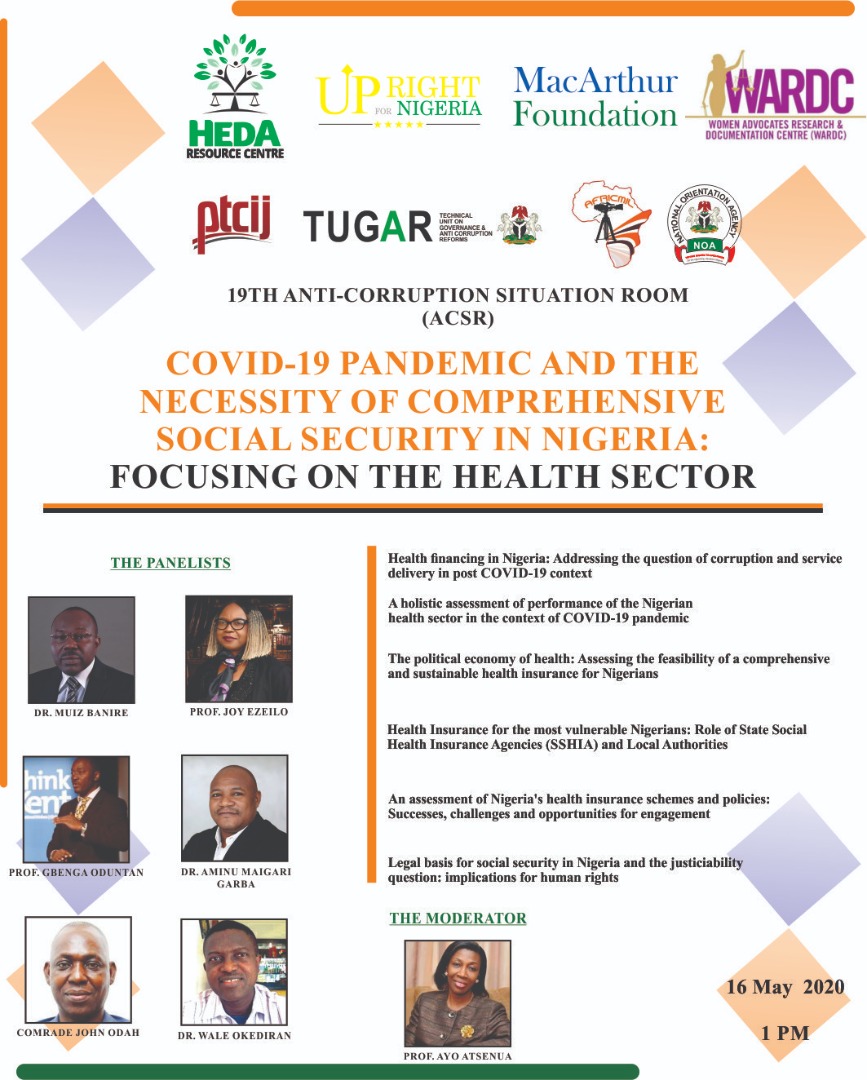By Doyin Ojosipe
Stakeholders have been urged to consider whistleblowing as a tool for combatting all dimensions of corrupt practices in the health sector.
The charge was given at a webinar organised by the Human and Environmental Development Agenda (HEDA Resource Centre), in collaboration with the Premium Times Centre for Investigative Journalism (PTCIJ), African Centre for Media and Information Literacy (AFRICMIL), Upright for Nigeria among others and supported by UkAid and MacArthur Foundation.
The19th edition of the Anti-Corruption Situation Room (ACSR), which held online, on Saturday, May 16, 2020, examined the COVID-19 Pandemic and the Necessity of Comprehensive Social Security in Nigeria: Focusing on the Health Sector.
In a presentation titled, “Health Financing in Nigeria: Addressing the Question of Corruption and Service Delivery,” Prof of Law at the University of Kent, Gbenga Oduntan, said aspects of corrupt practices such as deliberate absenteeism from work, diversion of patients from public to private hospitals by some doctors and health workers, procurement of inappropriate medical equipment, manipulation of data, etc., are issues that are seldom talked about.
He said there was need to encourage whistleblowing in the sector to promote transparency and development.
Oduntan also noted that it was bad enough that the federal government only pays a meagre sum of six dollars for the health of individual Nigerians for a whole year, but even worse that the money is being siphoned by corrupt individuals. “We are not spending enough on health and the little spent is being carted away via corrupt practices. Money that should be spent on health is being siphoned through illicit financial flow,” he noted.
He said the many dimensions of corruption in the health sector has made it difficult to achieve Universal Health Coverage for all Nigerians.
Similarly, the Dean, Faculty of Law, University of Lagos, Prof Ayo Atsenua, corroborating a point earlier raised on incompetence of public office holders, said it was part of corruption to appoint people who know next to nothing about public offices based on cronyism, adding that it was one of the reasons the right decisions are not being made and or steps not taken in the right direction as those appointed are not competent enough to run their offices.
On his part, former Lagos State Commissioner for Environment, Dr Muiz Banire, who spoke on “An assessment of Nigeria’s health insurance schemes and policies: success, challenges and opportunities for engagement,” noted that the price of incompetence of public office holders far outweighs that of corruption, and should not be ignored.
He said incompetent officers “do not know their right from left, how do they prioritise?” According to him, “When you have the right kind of people in position, both at the parliament and legislative level and at the executive level, they can start understanding issues being raised.”
He noted that the issue of incompetence had been ignored for a long time, adding that addressing it alongside corruption will make anti-corruption efforts worthwhile. “We need to start addressing the issue of incompetence alongside that of corruption. Over the years now, we have been talking about corruption without paying any attention to the issue of incompetence. We must start raising the issue and putting the right persons in the right positions so that at the end of the day we can achieve our aim.”
Participants called for a National Strategic Initiative that will tackle corruption at all levels, enhance greater budget monitoring and performance and create the framework for improved funding of public health. They noted that fighting corruption must include a transparent electoral process that will produce only competent and efficient people committed to serving the people than working for parochial interests.
Some of the participants were Executive Director, Women Advocacy Research and Documentation Centre, (WARD-C), Dr Abiola Akiode, Prof Shehu Abdullahi, Mr Dayo Olaide of MacArthur Foundation. Resource persons included former General Secretary, Nigeria Labour Congress (NLC), Comrade John Odah, former UN Rapporteur, Prof. Joy Ezeilo, former Member, House Representatives, Dr Wale Okediran, Dr. Magashi Garba as well as representatives of media organizations.



